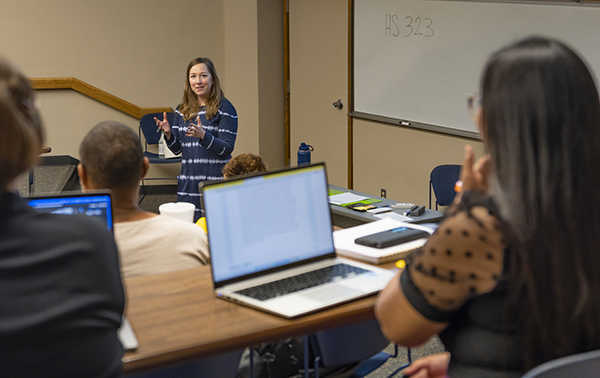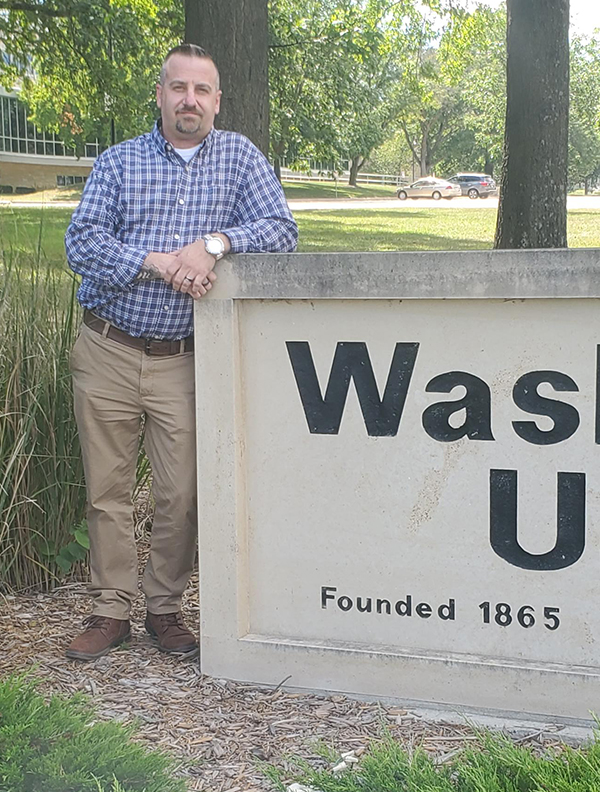Road to Recovery
Addiction counseling program meets needs of growing problems

Stacy Conner teaching Service Coordination in the health sciences department. Conner is the coordinator of the addiction counseling master’s program at Washburn. Photo by Jeremy Wangler
From The Ichabod - Fall 2022
By Angela Lutz
When Nick Casarona started working as a peer recovery mentor, he knew he’d found his calling. After going into recovery from drug addiction at the age of 41, he worried he’d wasted too much time – that his past, including a ruined career and jail time, would keep him from making a meaningful professional impact. But he quickly discovered his own struggles with addiction could allow him to help others heading down the same path.
“I decided to study addictions counseling because of my own personal experiences,” he said. “Two weeks after graduating high school I broke my neck and got prescribed pain medication – eventually it got out of control and pretty much destroyed my life and everything I’d ever worked for. It’s not something I ever thought would happen, but here I am now in a completely different life.”
 Today, Casarona is the recovery coach supervisor at Heartland Regional Alcohol and Drug Assessment Center in Kansas City, Kansas, and he’s working toward his bachelor’s degree in addiction counseling through Washburn’s family and human services department in the School of Applied Studies. He said he is living proof people can change – and other people recovering from drug and alcohol addictions can help show them the way.
Today, Casarona is the recovery coach supervisor at Heartland Regional Alcohol and Drug Assessment Center in Kansas City, Kansas, and he’s working toward his bachelor’s degree in addiction counseling through Washburn’s family and human services department in the School of Applied Studies. He said he is living proof people can change – and other people recovering from drug and alcohol addictions can help show them the way.
“When I started in recovery, I thought there was no hope for change, but I met people who were able to help me figure it out,” Casarona said. “My personal journey combined with my education allows me to help so many others. They say that if you find something you love you never work a day in your life, and that’s kind of where I’m at with this.”
Filling a Vital Need in the Area
For Stacy Conner, assistant professor, family and human services, who currently coordinates the addiction counseling master’s program and previously spearheaded the bachelor’s program, this type of education fills a vital need in the area. Drug addiction is a growing problem across the country, and counselors are desperately needed in Kansas.
“To educate people in a field that has high demand is incredibly important to our area,” she said. “We’re helping to feed the pipeline of people who can do this work side by side with people who are needing to get into recovery.”
To help students gain experience, Washburn’s program includes internships where students work with a licensed supervisor at a site in their community. Because the master’s program is based online, this allows students to become invested in working where they live, which has been beneficial for care access in central and western Kansas.
“Seeing addiction counseling happening live and practicing it with the support of a supervisor and with actual people who are going through it is valuable to their development in the field,” Conner said. “They get to see if it’s a good fit for them, and that makes them more ready for the career itself.”
Washburn’s program also offers specialties students can incorporate into their degree plan, such as trauma and recovery or family services. According to Conner, this helps students gain a more complete picture of addiction, which often includes many factors beyond substance abuse. Certificate programs also allow students who have completed another degree or are returning to school to quickly expand their educational horizons.
Value of Personal Experience
For many students, education is bolstered by personal experiences. Washburn graduate student Renee Sheldon was drawn to the university’s addiction counseling program after dealing with addiction in her family when she was a child. Today, she works as a high school addiction counselor at Sea Mar Community Health Centers in Vancouver, Washington, helping young people achieve positive outcomes.
“A lot of the kids I work with who struggle with addiction were first introduced to it in their families,” Sheldon said “I want to be the person they can trust – a lot of them don’t trust adults very easily. I want to help instill those skills I lacked going into adulthood.”
“At Washburn, I’ve gained a ton of experience,” Casarona added. “The clinical side of the program has given me a lot more tools to help clients find the path to recovery. I also share my own personal story. It’s not just about the substance – there’s so much underlying turmoil that goes on within.”
Because Casarona and Sheldon are both parents who work full time, the flexible nature of Washburn’s programs is also appealing, allowing them to expand their knowledge and expertise and become leaders in their field.
“I am a much more effective addictions counselor having gone through this program and am better able to bridge the gap between needs and resources,” Sheldon said. “The discussions are so relevant and the professors are very involved. What they teach in this program is exactly on point with what we need to be successful in the field.”